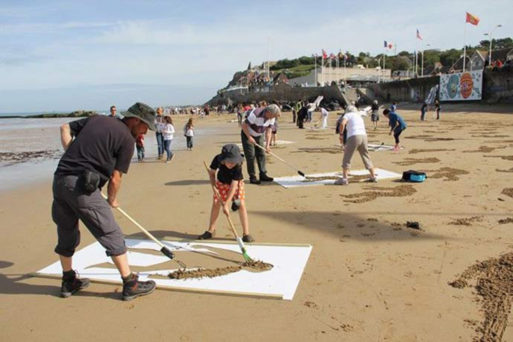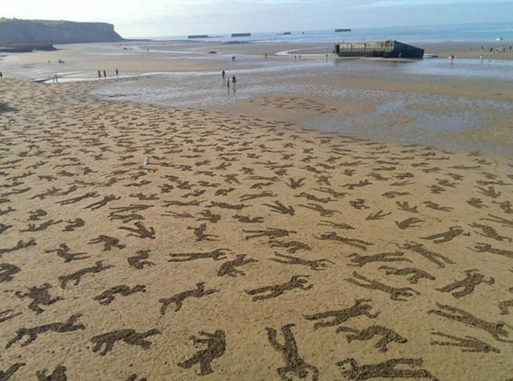
D-Day art installation “The Fallen 9000” created by Jamie Wardley and
Andy Moss and installed in 2013
Credit: historyhit.com
In honor of the 75th anniversary of D-Day, we repost an emotional collaborative art installation from almost six years ago that is still in our hearts.
On June 6th, 1944, the Allies attacked German forces on the shores of Normandy, winning a battle that would serve as a major turning point in WWII. Ever since the triumph of D-day, those thousands of casualties have been noted in textbooks and museum halls with ceremony and respect. Today, on the seventy-fifth anniversary of D-Day, we revisit a collaborative project in 2013 by artists Jamie Wardley, 33, and Andy Moss, 50, titled, “The Fallen 9000.” The concept was to “make a visual representation of 9,000 people drawn in the sand [in Normandy] which equates the number of Civilians, German Forces and Allies that died during the D-day landings,” says the duo’s website. The result was a piece that brought contemporary tangibility to the losses of D-day, and, as Moss says, “an example of what happens in the absence of peace.”
Liberating mainland Europe couldn’t have been possible without the invasions, which historian Corelli Barnett describes as a “never surpassed masterpiece of planning” that began a year in advance. Today on its 75th anniversary, D-day is noted as the largest seaborne invasion in history, having employed 6,939 naval vessels, 23,400 airborne troops, and 50,000 vehicles. “The eyes of the world are upon you,” said Dwight D. Eisenhower to his troops prior to the day, “[and] the hopes and prayers of liberty-loving people everywhere march with you.”
“But to the team’s surprise, hundreds of volunteers showed up to lend a hand. “[It] was a quiet day with a very loud statement,” says Moss.”
The day of their project, Wardley and Moss were expecting about 70 volunteers – not enough to create the 9,000 proposed stencils before the tide came in, and washed them away. But to the team’s surprise, hundreds of volunteers showed up to lend a hand. “[It] was a quiet day with a very loud statement,” says Moss, who said even he didn’t expect to see so many fly in from all over the world. “My mother, partner, and friends [were all there],” he says, “[a woman named] Monika Kershaw was there, remembering her son and his colleagues that died in Afghanistan. George, a veteran who was on the D-day beaches was also there and embraced the importance of the project as demonstrating the result of conflict. [Then there was] a group from Israel that drew [people] together, from Germany, Finland and as far as Chile.”

The artists with over 500 international volunteers drew 9000 stenciled
bodies in the sand at the D-Day landings
Credit: historyhit.com
What’s most striking about the project is the simultaneous sense of unity and individuality one feels when looking at it. We can let our eyes travel the 9,000 silhouettes made in the sand, and get lost in the enormity of it all. But we can just as well focus on the outline of one body – the impression of an individual and the impact they had on our freedom.
You may also like:
- Visiting the New Orleans National WWII Museum website
- SevenPonds & the WWII photography of Lee Miller: The model-muse turned journalist captured unparalleled images of WWII

 On The 75th Anniversary of D-Day
On The 75th Anniversary of D-Day



 Our Annual Seven Holiday Gifts for Someone Who Is Grieving, 2024 Edition
Our Annual Seven Holiday Gifts for Someone Who Is Grieving, 2024 Edition
 “Making Mobiles” by Karolina Merska
“Making Mobiles” by Karolina Merska
 “Hands Up to the Sky” by Michael Franti & Spearhead
“Hands Up to the Sky” by Michael Franti & Spearhead















An amazing video not to be missed!! Incredible details of D Day I wept through…
Report this comment